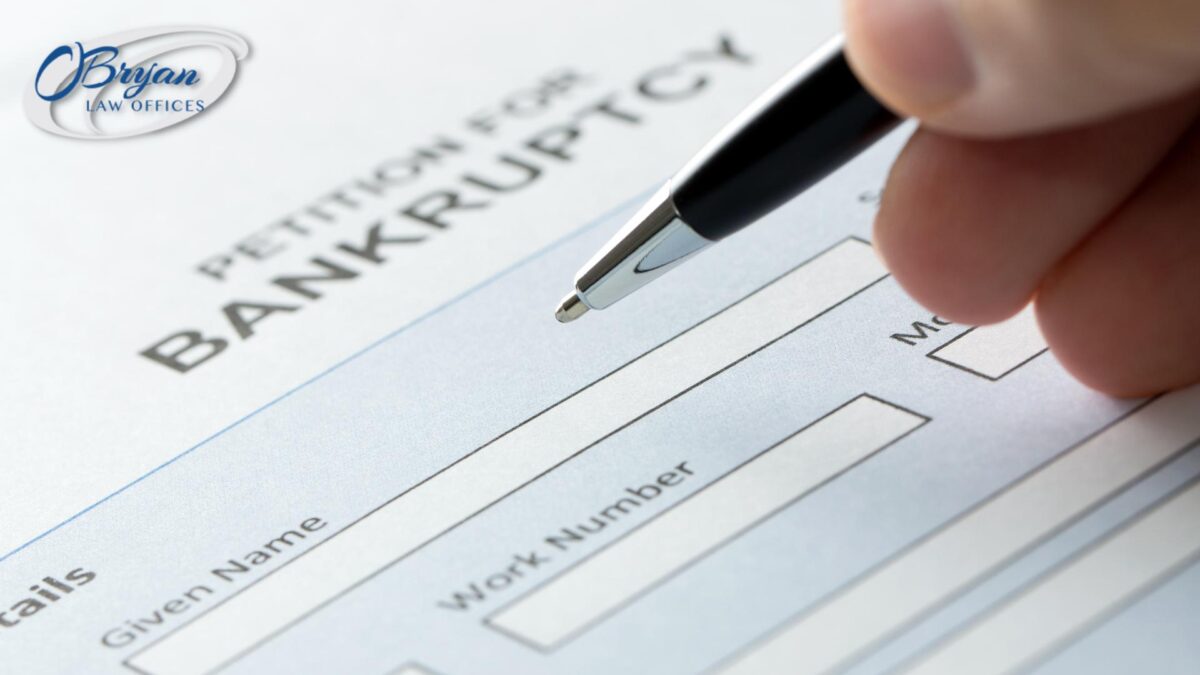

Facing the receipt of a writ of garnishment can be a stressful experience, leaving you with many questions and concerns. At the O’Bryan Law Offices, we understand the complexities and emotional toll these legal actions can have.
In our latest blog, the Kentucky bankruptcy attorneys will simplify the process, explain your rights and responsibilities, and offer practical steps to navigate this challenging situation.
Whether you’re wrestling with the initial shock or seeking solutions to protect your financial stability, our insights aim to empower you with knowledge and confidence. To schedule a free consultation with one of our experienced bankruptcy attorneys, call (502) 339-0222 today.

Garnishment is a method creditors use to collect debts directly from a debtor’s wages or bank accounts. It follows a court order or judgment and comes in two forms: wage garnishment, where a portion of a debtor’s paycheck is withheld, and non-wage garnishment, targeting funds in bank accounts. The law limits the amount that can be garnished to protect the debtor’s ability to cover basic living expenses.
While federal law protects employees from being fired for a single wage garnishment, multiple garnishments for different debts don’t have this protection. Certain incomes, like Social Security, are usually exempt. Debtors have rights, including receiving notice, disputing the debt, and claiming exemptions based on financial hardship.
If you are facing wage garnishment that could serious impact your finances, contact a wage garnishment attorney in Kentucky with O’Bryan Law Offices.
A judgment creditor is an individual or entity that has successfully obtained a court judgment against a debtor for an unpaid debt. This status grants them legal rights to collect the debt through wage garnishment, bank account levies, and property liens.
The judgment is enforceable for a specified period, often several years, and can sometimes be renewed. In bankruptcy cases, judgment creditors may have priority over other creditors for repayment. The judgment creditor must take additional steps to enforce the judgment, as it does not automatically ensure payment.
A judgment debtor is an individual or entity in a court order to pay a debt following a lawsuit where the creditor wins. This status brings legal obligations to pay the specified debt amount.
The debtor may face enforcement actions like wage garnishment, bank levies, or property liens. They might need to disclose assets to facilitate debt recovery. Judgment debtors have rights, including exemptions on certain income types and the ability to contest the judgment.

A writ of garnishment is a legal order issued by a circuit court or district court that enables a creditor to seize a portion of the judgment debtor’s wages to satisfy an unpaid debt. This action follows a judgment favoring the creditor and is often used for debts like child support, taxes, student loans, and other obligations.
The writ is directed at a third party, such as the debtor’s employer or bank, instructing them to withhold a specific amount from the debtor’s earnings or accounts and remit it directly to the creditor. The process is governed by legal limits to ensure the debtor retains enough for basic living expenses and involves notifying the debtor about the garnishment.
When you receive a garnishment summons, a creditor has initiated legal action to seize a portion of your wages or bank account funds to satisfy a debt. This notice typically follows a court hearing for an unpaid debt. Upon receiving it, your employer or bank will withhold a specific amount of your earnings and be directed to the creditor.
The garnishment summons served will include important details like the amount of debt, the portion to be garnished, and your legal rights. You can contest the garnishment, typically within a set timeframe, and may claim exemptions based on your financial situation. It’s crucial to respond promptly and consider seeking legal advice to understand your options and protect your interests.
You risk facing serious legal consequences if you don’t comply with a garnishment summons. Ignoring the summons does not make the debt or the legal action go away; instead, it can lead to more severe measures. The court may issue further judgments against you, potentially increasing the debt with additional fees or interest.
In the case of wage garnishment, non-compliance could result in your employer being ordered to withhold a portion of your income. The bank may freeze the required funds if the garnishment involves your bank account. Non-compliance can also negatively impact your credit score and overall financial standing.
After you’ve received a garnishment summons, it’s important to contact the Kentucky wage garnishment attorneys at the O’Bryan Law Offices to understand your rights and how to navigate the situation effectively.
In Kentucky, various types of income and assets can be subject to garnishment to satisfy outstanding debts. This includes wages, salaries, commissions, bonuses, and other earnings. However, there are legal limits to protect a portion of the debtor’s income for basic living expenses.
In addition to wages, bank account funds may also be garnished. Certain types of income are generally exempt from garnishment, such as Social Security benefits, disability payments, and veterans benefits. However, there are exceptions for debts like child support payments, alimony, taxes, and student loans.
Yes, checking and savings accounts can be garnished. When a creditor obtains a court order for garnishment due to unpaid debts, they can target funds in a debtor’s bank accounts, including checking and savings accounts. This process involves the bank being instructed to freeze and then withdraw the specified amount from the debtor’s account to be paid directly to the creditor.
In Kentucky, certain funds in bank accounts are protected from garnishment. These include supplemental security income (SSI), disability benefits, veterans’ benefits, child support payments, specific retirement accounts and pensions, unemployment benefits, and workers’ compensation. However, these protections can be limited if the garnishment is for obligations like child support, alimony, taxes, or certain government debts.
It’s important to note that it can be difficult to claim exemptions once exempt funds are mixed with other money in an account. For specific cases, legal consultation is recommended to understand the protections applicable to bank accounts in Kentucky regarding garnishment.
In the event of a non-wage garnishment, the creditor can access your bank account and take some or all of the money in that account. This is also known as a bank levy. Under these circumstances, the creditor can take the non-exempt funds and apply them to the balance of the judgment.
A creditor can garnish a specific portion of an individual’s paycheck depending on the type of debt and applicable federal or state laws. For most consumer debts like credit card balances, medical bills, and personal loans, federal law limits garnishment to the lesser of 25% of the debtor’s disposable income (income remaining after mandatory deductions) or the amount by which their weekly disposable earnings exceed 30 times the federal minimum wage.
Up to 50-60% of disposable earnings can be garnished for child support or alimony. The U.S. Department of Education can garnish up to 15% for defaulted student loans, while the IRS has its formula for tax debts.
It’s important to note that state laws may offer more protection, setting lower limits on garnishment amounts. However, Kentucky follows the same guidelines as federal laws. This legal framework aims to balance the creditor’s right to collect debts with the debtor’s need to maintain a basic standard of living.

Managing your debts and understanding your legal rights is essential to avoid garnishment in Kentucky. Start by communicating with creditors to negotiate payment plans or settlements before debts reach the garnishment stage. Creating a budget and prioritizing debt repayment can help you stay on top of your financial obligations.
If a lawsuit is filed, don’t ignore it; responding can provide an opportunity to contest the debt or negotiate a settlement. Seeking the counsel of a bankruptcy attorney in Kentucky can be beneficial, as they can offer strategies specific to your situation.
Staying informed about your rights under Kentucky’s garnishment laws can help protect your interests. For example, knowing which types of income are exempt from garnishment in Kentucky, such as certain pensions and public benefits, can be crucial in safeguarding your assets. Taking these steps can help you manage your debts more effectively and reduce the risk of facing wage or bank account garnishment.
Challenging a garnishment is a legal right you have if you believe the garnishment is incorrect or unjust. To initiate this challenge, you must file a written objection with the court that issued the garnishment order, typically within a specified time frame.
In your objection, you can dispute the validity of the debt, the amount claimed, or the garnishment’s legality, especially if it infringes upon exempted income like Social Security benefits or exceeds legal garnishment limits.
You may also raise a defense if the creditor did not follow proper legal procedures. Providing evidence to support your claims is crucial, such as proof of exempt income or calculations showing that the garnishment exceeds legal limits.
Working with the Kentucky wage garnishment attorneys at the O’Bryan Law Offices can be immensely helpful in navigating this process, as they can offer guidance for challenging the garnishment and assist in preparing and presenting your case effectively to the court.
To set up a payment plan and potentially avoid garnishment, first, assess your financial situation to determine an affordable monthly payment amount. Contact your creditor or their collection agency to negotiate a payment plan, being transparent about your financial capacity.
Once an agreement is reached, ensure it’s documented in writing, clearly stating the payment terms, total payments, and any changes to interest or fees. Adhere strictly to the payment schedule and keep detailed records of all payments made.
This proactive approach can be a mutually beneficial solution, but it’s important to commit to a realistic plan that fits within your overall financial obligations.

Filing for bankruptcy can effectively address wage garnishment, offering relief and a path to managing debt. An automatic stay is imposed upon filing, halting most wage garnishments immediately. This stay applies to various debts, though exceptions exist for obligations like child support and alimony.
In Chapter 7 bankruptcy, many debts leading to garnishment can be discharged, potentially stopping the garnishment permanently. Chapter 13 bankruptcy reorganizes debts into a manageable repayment plan, which may reduce the garnishment amount.
In certain circumstances, previously garnished wages might be recoverable. However, bankruptcy has significant long-term impacts on credit and incurs legal and filing costs.
Working with the O’Bryan Law Offices for wage garnishment issues offers expertise, personalized legal strategies, and a supportive approach tailored to your unique financial situation. Our experienced attorneys help clients navigate the complexities of wage garnishment laws in Kentucky, ensuring that their rights are protected every step of the way.
With their commitment to understanding each client’s specific needs and providing clear, practical legal advice, O’Bryan Law Offices stands out as a reliable ally in resolving wage garnishment challenges.
Whether you’re seeking to challenge a garnishment, negotiate with creditors, or explore other financial relief options, like filing for bankruptcy, their team’s knowledge and dedicated support can make a significant difference in achieving a favorable outcome and restoring your financial stability.
To discuss your options regarding impending wage garnishment, schedule a free consultation with one of our experienced bankruptcy attorneys by calling (502) 339-0222 today.